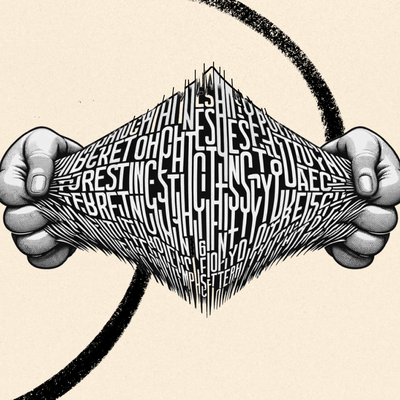.png)
Today’s piece is a bit different—it’s a short story by Dan Shipper that is a part of the book he’s writing. Read the first five pieces in this series, about the new worldview he's developed by writing, coding, and living with AI; how AI will impact science, business, and creativity; and how tools shape how we see the world. We’re off tomorrow for Veterans Day in the U.S. and will be back on Wednesday.—Kate Lee
Was this newsletter forwarded to you? Sign up to get it in your inbox.
For my money, the West began in an Athenian mansion in 430 B.C. Within it the philosopher Socrates debated the venerated teacher Protagoras about a simple question:
Can excellence be taught?
Not excellence in archery or carpentry—no one doubted that specialized skills could be taught—but the deeper kind of excellence the Greeks called aretḗ: the general excellence that makes a person a good citizen, a good decision-maker, and a fully realized human being.
We know about this debate because it was immortalized by Plato in his dialogue Protagoras, which tells us more or less what was argued:
Protagoras said “yes,” general excellence can be taught. Every moment of a child’s life, he argued, is training in excellence: Through imitation, story, and experience we learn how to live well.
Socrates, the philosopher, said “no.” And he argued it through a new form of thinking: philosophical inquiry. He asked Protagoras to define excellence—was excellence one thing or many? Were justice and courage part of excellence, or something separate?
Protagoras, one of the most famous and well-regarded teachers in Athens, could not define it. Each idea he offered collapsed in self-contradiction—as did his reputation. After all, how could he claim to teach aretḗ if he could not even say what it was?
This debate reminds me a lot of AI. For decades, we followed Socrates—trying to define intelligence, to find a theory of it that would lead to AGI. Then a small renegade group of researchers eschewed theory in favor of a different approach: training neural networks on vast amounts of data. And suddenly real machine intelligence was born.
These systems, in their strange way, are an answer to Socrates’s question about how we can teach what we cannot define. And in their own way they vindicate Protagoras: They show us that excellence can be learned through training, and we can become excellent at things we can’t fully explain.
I’ve always wondered what happened to Protagoras after that night in Athens. I wondered—in the same way we discovered neural networks—whether he figured out how to teach what can’t be defined. And so I wrote a story about it.
When the lamps were finally extinguished in Callias‘s house and the great men had made their way home, Protagoras walked the dark streets of Athens.
For 40 years he had wandered Greece teaching excellence. He had helped craft laws for distant cities and advised Pericles himself. But Socrates’s question haunted him. He could recognize excellence, nurture it, even teach it. But define it? Grasp it in his hands and show another exactly what it was? No.
In the years that followed, Protagoras circled on this question. He gave up teaching in the houses of Athens’s wealthiest citizens. The Peloponnesian War broke out, and the boys he had taught marched off to battle. But Protagoras felt nothing because he saw nothing; the faces of those men were like masks to him, indistinct and abstract.
Eventually, Protagoras exchanged his flowing purple robe for a rough one, as he no longer used his eyes. Eyes in disuse, his sight itself began to fade. Slowly, Protagoras went completely blind.
In 430 B.C., Athens was struck by a plague. The sick and dying lay in the streets. Protagoras sought refuge in a temple of Hermes, god of boundaries, messenger of the gods, guide to the underworld, and protector of the blind. The temple sat at the first milestone from Athens, where two roads met. It was no Acropolis, just a mound of stones—a herma—to mark the junction, with a crude shelter built around it. The shelter had walls of wood scavenged from carts abandoned on the dusty road, and a patchwork roof made of tile and thatch carefully pitched so that rain ran down into collection jars. Merchants met at the herma to make offerings to its namesake god, who protected travelers and businessmen alike, and to exchange goods from far-off lands to be sold in the markets at Athens.
The shelter housed a gang of orphaned children, blinded by plague but still alive, their families killed by the disease that devastated their city. They took offerings from the travelers who passed by, sang hymns to Hermes, and sat all day in the hot, sun-hardened dirt next to the temple.
“By Hermes himself, I’ll pay double the market price. Double!” The high-pitched voice cracked through the herb-soaked cloth covering its owner’s mouth.
The plea was directed at a Phoenician trader who’d set up shop near the temple. In the surrounding darkness, Protagoras recognized the voice as belonging to Callias, the man whose mansion had housed his fateful debate with Socrates.
“Pure white hellebore, from the mountains,” said the Phoenician. His voice was deep and jagged. “I already have a buyer in the city, but if you can pay me now I will forget about him.”
Callias clutched a leather pouch to his chest with shaking hands. For three weeks he’d been trying to buy hellebore root for his granddaughter’s fever. “Yes, but only if you’ll swear they’re real.”
They stood far apart, as plague custom demanded, their words carrying across the dusty crossroads. The morning sun cast their shadows toward the herma, where the blind children huddled, listening.
“And how will I know that what you offer to pay me with is real?” said the Phoenician. “I don’t know you. Why would I risk plague to test your silver with my teeth.”
“The silver is good,” Protagoras said from the shelter’s doorway. “I’ve known Callias since he was a boy.”
The Phoenician turned toward the voice. “Protagoras? The sophist?” A pause. “Then you know about such things. Come, test this silver yourself, and the hellebore too. Your word would be enough.”
“These days I keep my distance.” Protagoras gestured at the space between them, thick with the miasma of plague. “As we all must.”
“A wise man. But without someone to test it, there can be no trade. Not with death in the air,” said the Phoenician as if casually flicking a fly off of his arm. He began to pack away his goods. “Perhaps when the plague passes.”
“When the plague passes,” Callias repeated hollowly, “my granddaughter...”
The Only Subscription
You Need to
Stay at the
Edge of AI
The essential toolkit for those shaping the future
"This might be the best value you
can get from an AI subscription."
- Jay S.
Join 100,000+ leaders, builders, and innovators

Email address
Already have an account? Sign in
What is included in a subscription?
Daily insights from AI pioneers + early access to powerful AI tools









Comments
Don't have an account? Sign up!
I love how this story shows the value of this kind of learning (this kind of knowledge). Arising directly from experience, strengthened (reinforced, confirmed) by shared experience and compared results. Great analogy for AI modeling.
But I still sense this slit that never seems to go away - the one Socrates was using in his argument. While I think Aristotle would argue that the Protagorean form of knowledge is the only one we have access to - concepts arise from experience (there is no form of a chair, just the notion of chair we get from encountering many chairs and not chairs), Plato would argue that there is more. There are aspects that have not been well represented in our experience, yet are still true, and we can work to discover them, but not in the way the children were taught. I wonder if there is an analogy, a similar story, that would be Socrates' answer to this - how there is still more, and how it might be learned. Would this highlight something the current AI approach can't reach?
I've been picturing AI aids the way I used to think about what I called the two infinities on my sixth grade ruler. There were the infinities between all the marks within the 12 inches. AI can help us find those, I think. Then there are the infinities beyond the ends of the foot - in both directions. I'm not sure our current approach can help with those.
@semery Thanks for reading and the thoughtful comment! For me the story’s not mainly about empiricism (though that is one valid reading) but about distributed, inarticulable knowledge—the kind that can’t be fully explained or formalized. Plato’s Forms actually fit inside of that, and I think high-dimensional spaces are quite an interesting version of what he was talking about
In this case, the story is about recognizing something empirical, but I would bet neural networks can help us find the infinities beyond the ends of the ruler, too! Maybe I should write about that next :)
I love this unexpected post! I have been delighting myself bringing concepts, even ancient philosophical concepts, to life using AI to stage dialogues. But this is a full-fledged story, and a quite captivating one at that. Excited to read the next entries. PS Why add bold to the character names in a short story?
@federicoescobarcordoba glad you liked it! the bold is just our house style :)
@danshipper This piece rekindled an unapologetic desire to revisit the Apology! Speaking of craft, I noticed a couple of tiny style details you might want to glance at (“Callias‘s house” vs. “Callias’s house” at the beginning, and a missing question mark after “Why would I risk plague to test your silver with my teeth”).
If you ever decide to nudge this further toward literary fiction, Janet Burroway and Stephen King both have wonderful thoughts on dialogue tags and adverbs in Writing Fiction and On Writing, respectively. That said, I enjoyed how your prose carries the ideas—form serving philosophy.
And just a small note of curiosity: the line “His fingers knew. But how to teach fingers to know?” made me wonder. It’s beautifully phrased as is, though “But how to make other fingers know?” might make the meaning a touch clearer.
Bravo -- this story is the best explanation-by-analogy of LLMs for the lay person that I've encountered so far. But like all good explanations (see David Deutsch's book "The Beginning of Infinity", 2011), it suggest, or makes explicit, additional areas or aspects that are yet unknown, uncovered, unexplained; specifically, what is being perceived, or experienced, to change the child's learned tone from "discordant" for true silver or hellebore to "pure"? Protagoras' admonition to "sing what's different" is instructional, encouraging, but is not itself an explanation (of *what* to do). Scientific theory progresses, advances, by the production (by people) of better and better (improving, more detailed, more accurate, more corresponding to...) explanations, yet we're told that how LLMs work defies analysis and explanation (unlike algorithmic/procedural computing). Yet can we not expect that the very success of LLM/AI chatbot/products will ultimately yield to new insights, and a "better explanation" (theory) of LLM computation? I'm an optimist, now (formerly a skeptic)...
Thanks, Dan, for this excellent, thought-provoking piece!
@lorin thanks for reading and commenting! in a complex system with multi-finality and equi-finality like a neural network you CAN find hard to vary explanations, however they’re not universal. so you can find the conditions under which a system might shift to a discordant note in a particular situation—but because the system is equifinal (multiple paths to the same result) a hard to vary explanation that is GENERAL is by definition not possible, and imo not a good way to work with this kind of system. I do think we can expect better explanations and theory from them, just that they also point to the necessary limitations of theory
great question how can you teach what you cannot define......we are missing what should be at the top of the AI pyramid and that is love....how to you teach it ..by example and showing it and that bring wisdom from seeing what is true and what is not....reality will change that definition as it evolves
Fascinating story. Linking touch to singing is an ingenious move. It makes me think about the nature of tacit knowledge: does it mean knowledge that cannot be articulated by anyone, or just not by the particular teacher? In this case, I could imagine that with modern understanding of anatomy and psychology, the translation from touch to voice could, at least in theory, be articulated, right?
@Haihao.wu thanks for reading! yes you could definitely describe (theoretically) the translation from touch to voice for a single child—but that's just plumbing and would be unique to that particular child. it wouldn't tell you much about which notes mean what.
imo, it's not that tacit knowledge can't be articulated it just can't be fully and completely articulated and neural networks are a better way of transmitting it than explanations are
My dude... Awesome...